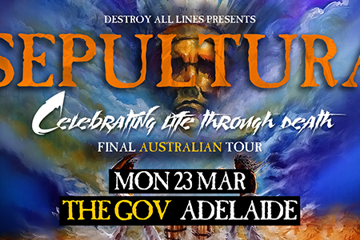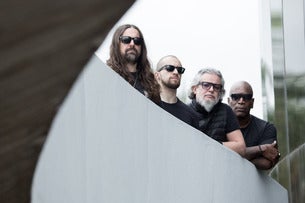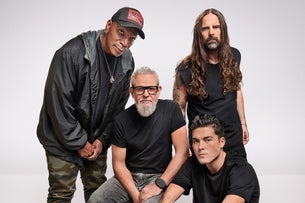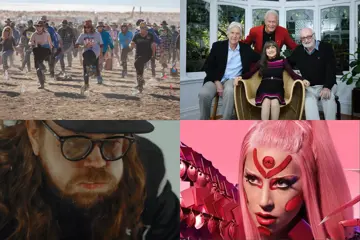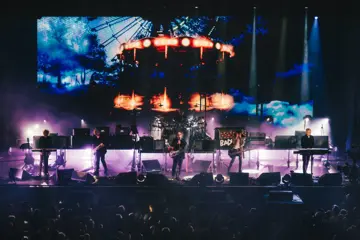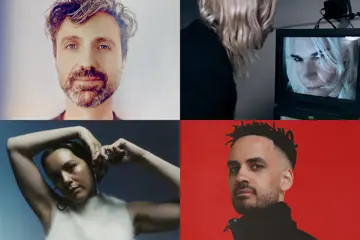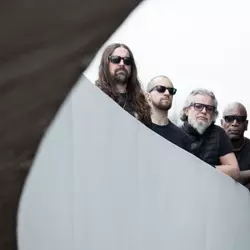 Sepultura
SepulturaRetiring with much fanfare - not to mention one last hefty pay-day - seems to be fast becoming the norm. Heavy metal godfathers Black Sabbath called it a day after a lengthy, lucrative last jaunt. Motley Crue did the same, and Ozzy Osbourne (as a solo artist) and Slayer have both announced extended farewell world tours.
After three-plus decades in the heavy music game, The Music asks Sepultura's always-affable guitarist Andreas Kisser whether he envisions the Brazilian metallers ever opting for a similar exit strategy. "I'll be very happy if we do it like that. If we announce, like, a farewell tour, something organised, something that everybody's really... With that idea in mind, and reflect a lot about possibilities and stuff, and not only break up or something like that," he says from his Sao Paulo home. "I think it's - I don't know the word, but it's a very decent way of quitting.
"I always respect Cream a lot, because they managed to do that. They had, like, a very short career, but they announced they were doing their farewell tour and they're going to go their separate ways, and that was it. It was very respectful, very adult," he laughs. "It's great that you have an opportunity to do that; you see Ozzy Osbourne, he's doing his second farewell tour. Everything's possible in metal," he laughs again.
Acknowledging their past while also keeping an eye on the future seems vital to the current line-up. Although this incarnation has done a few select shows playing classic Sepultura records in their entirety, the axeman has been dismissive of the type of heritage tours that former bandmates Max and Iggor Cavalera have undertaken via their recent Return To Roots touring run.
Don't miss a beat with our FREE daily newsletter
"To do a whole tour like that, it would be, like... A waste of time, at least for us. Because we are doing so much things now in the present with the new album [2017's Machine Messiah], we have the Sepultura movie, we have stuff that is happening now that we can focus all of our energy on. Plus we play the old stuff and everything. For instance, in 2018 we celebrate 20 years of Against, 20 years of [vocalist] Derrick Green in the band. It's one of the most important albums of our career, an album that kept us together. We're going to bring some songs that we don't play for many years from Against to celebrate that. But I'd rather be here now and really do what we do with the new album, which is much more exciting," he chuckles.
Kisser has remarked in other interviews that the Cavalera camp weren't involved in the aforementioned documentary, Sepultura Endurance, and blocked the rights to utilise some entire songs. "The movie came out last year. I'm very happy with the movie. It talks about our history, but mainly shows why we're still here, why we're still here touring, having a great label and an amazing following of fans all over the place; basically living the best moment of our career now.
"[There's] many subjects that, during these 33 years, we never really talked about. It was a cool opportunity to go through and also there's a lot of interviews with old managers, crew, friends and musicians that were inspired by Sepultura. It's really interesting, not only for the metal fans but to show other people this career of a Brazilian band, coming out of Brazil back in the 1980s and conquering what we did."
Also part of upcoming plans is an impending return to Australia, perennially one of their strongest markets. Along for the ride are thrash veterans Death Angel. Kisser recalls the first time the two bands played together; the 1990 Dynamo Open Air festival in the Netherlands, where Death Angel were headlining.
It's a double bill of two seemingly unlikely success stories - the Brazilian outfit and the teenage upstarts championed by Metallica's Kirk Hammett. "Of course they have the Filipino heritage, but they came from the Bay Area, which was a very fertile ground for thrash bands and metal bands," the guitarist reflects. "I think Death Angel's a very unique sound; I guess that Filipino heritage brought them some differences and made the music very unique. Sepultura, as well - of course in the beginning we had the influence from thrash metal, Slayer and stuff. But I think starting from [1993's] Chaos AD on, we finally found our own sound with the Brazilian percussion and everything. It's two different influences, cultural influences that made two bands that did something new and original."

